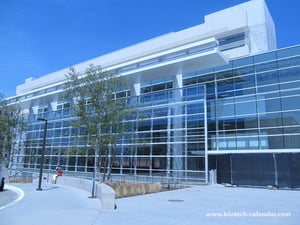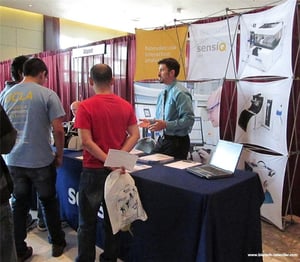A unique opportunity to advance research into the function of the human brain has been presented to three UCLA neuroscientists. Michele Basso, Dr. Peyman Golshani and Daniel Aharoni have received a $3.7 million, three-year grant from the National Institutes of Health (NIH) to develop imaging technology to record tens of thousands of neurons with the intent of learning how disease impacts the brain’s function.

Offered through NIH’s Brain Research Through Advancing Innovative Neurotechnologies (BRAIN) Initiative, the grant will support the team’s work to design, manufacture and test a miniature microscope able to measure brain activity in non-rodent animals. The goal is to develop ways to diagnose and treat neurological and psychiatric disorders, such as Alzheimer’s, Parkinson’s, autism, epilepsy and depression.
Brain diseases and disorders cast a devastating toll on human lives. The pursuit of cures for these illnesses starts with understanding the brain, one of the major frontiers in 21st century medicine.
The purpose of the national BRAIN Initiative, announced in 2013 by then President Barack Obama, is to accelerate the development and application of innovative technologies that will give researchers a better picture of the brain. This will help fill major gaps in information while providing opportunities to explore how the brain records, processes, utilizes, stores and retrieves information.
“There are nearly 100 billion neurons and 100 trillion connections between those neurons in the brain,’’ Basso stated in a UCLA Newsroom report. “The new techniques to be developed with this award will enable us to image larger regions of the brain, previously inaccessible regions of the brain, and more of the neurons within the brain than current technology allows. This provides a unique opportunity to get a signature of cognitive processes in health and disease.”
The new technology will enable higher-resolution imaging and longer wireless recording of brain activity, which will allow researchers to ask neuroscientific questions they previously could not, Basso continued. With a fundamental knowledge of the cause of brain diseases, scientists, engineers, and clinicians can work together to develop effective new treatments.
Basso, a professor of psychiatry and biobehavioral sciences and director of the Fuster Laboratory of Cognitive Neuroscience at the Semel Institute, will serve as team leader. Golshani and Aharoni are associate professors of neurology and leaders in the field of imaging technology.
The UCLA team will collaborate with scientists at other institutions, including Johns Hopkins University, the Massachusetts Institute of Technology and New York University, to test the devices they develop.
The three neuroscientists are based in the Jane and Terry Semel Institute for Neuroscience and Human Behavior, and the Brain Research Institute of the David Geffen School of Medicine at UCLA.
The Semel Institute, established in 2004 through a gift from Jane and Terry Semel, enables UCLA staff to expand research, teaching and activities supporting the university’s Healthy Campus Initiative. The David Geffen School of Medicine is home to scientists and physicians as well as faculty within the Schools of Engineering, Life Sciences and Physical Sciences
With this funding and recent philanthropic gifts, scientists at the university have the means to purchase many new laboratory products that will benefit their research. Biotechnology Calendar, Inc. produces the Biotechnology Vendor ShowcaseTM event at UCLA twice a year. This event provides a premiere opportunity to market lab supplies to active life science researchers at the university. This semiannual event brings hundreds of active researchers together with scientific supply companies, so that the researchers can find the best and newest products and technologies available that will further their work. 
The 43nd Semiannual Biotechnology Vendor ShowcaseTM event in Los Angeles will be held on April 4th, 2019. Last year, the two events at UCLA together brought 1,023 attendees from 46 different research buildings and 80 on-campus departments. Of these attendees, 223 were purchasing agents, professors and post docs, and 144 were lab managers.
To learn more about participating in this popular event, visit the link below:
Researchers in Los Angeles are invited to attend this event for free. To learn more and pre-register, please visit the following link:



